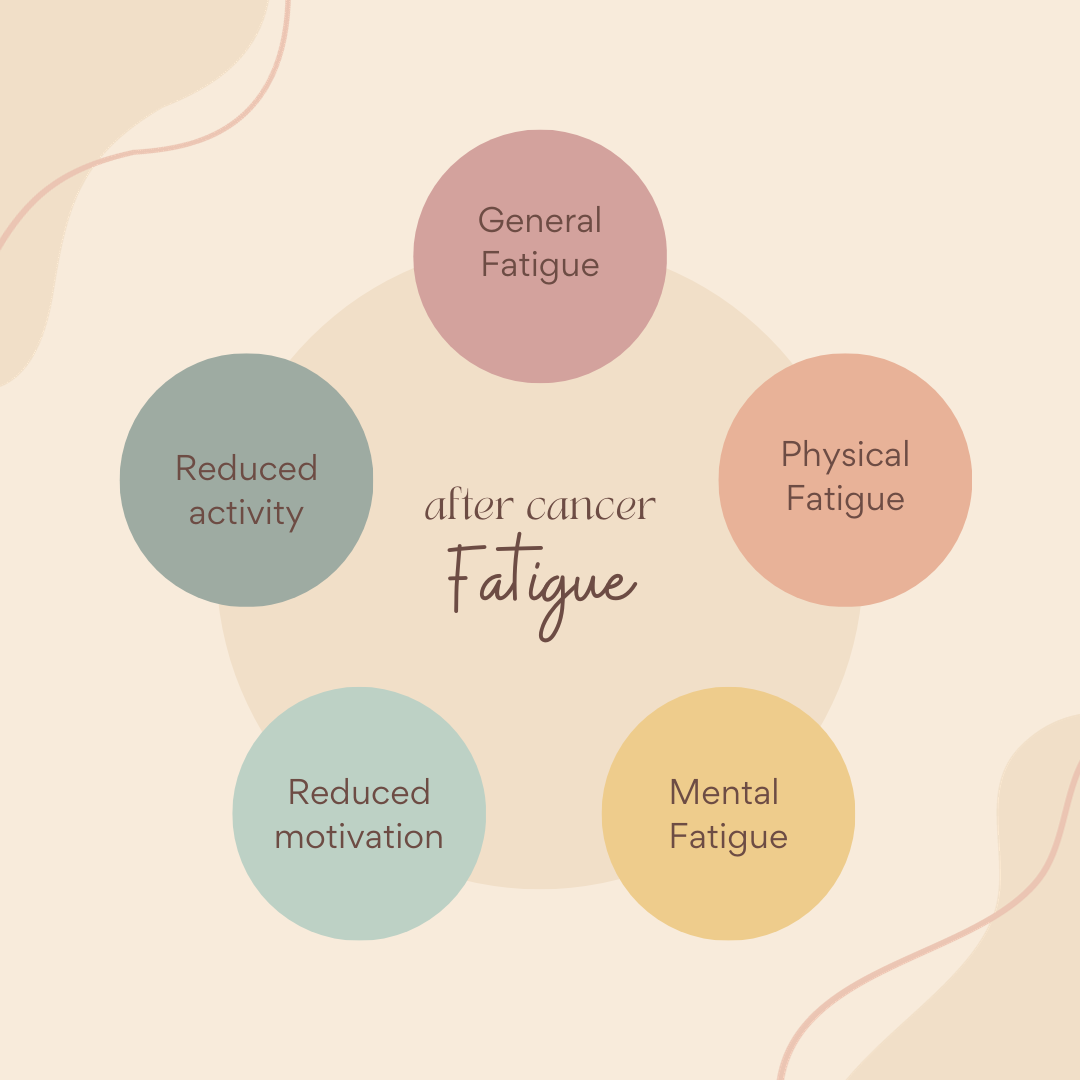The 5 misconceptions of cancer fatigue vs normal fatigue: a masterclass

Which Exercise Approaches Work for Relieving Cancer-Related Fatigue 🤔
— JOSPT Community (@JOSPT) October 17, 2023
Spoiler 🚨 - Combined aerobic and resistance exercise is effective pre, during and after cancer treatment
Read the results for yourself 👉 https://t.co/WjhIP8spLx#Cancer #Fatigue #Exercise #yourJOSPT pic.twitter.com/tw7Y7zkVPg
Introduction to cancer fatigue vs normal fatigue
In this article, I delve into the distinction between cancer fatigue vs normal fatigue. Fatigue after cancer is not just feeling tired; it’s often described as extreme exhaustion. Some people endure it constantly, while others face it intermittently. This overwhelming feeling can catch you off guard, severely limiting your daily life. We’ll explore symptoms, a questionnaire, and discuss some home remedies.
Research indicates that 60% to 90% of individuals diagnosed with cancer experience extreme fatigue during or after treatment, with 20% to 40% suffering from long-term extreme fatigue.
60% – 90%
of cancer patients suffer from extreme fatigue during or after treatment
20% – 40%
of cancer survivors suffer from long term extreme fatigue
30% – 50%
average energie level of cancer survivor compared with before the diagnosis
CANCER FATIGUE vs NORMAL FATIGUE
Fatigue after cancer is entirely different from regular fatigue. It feels distinct, but explaining it can be challenging. Let’s look at the 5 biggest misconceptions about cancer fatigue vs normal fatigue.
1. Sudden and Mysterious: Cancer-related fatigue is like an unexpected guest. It appears out of nowhere. You could be fine one moment and utterly drained the next. It’s like magic, but not the fun kind.
2. Your Immune System’s Response: Your immune system becomes hypersensitive during cancer and its treatment. Picture it as an overactive security system. It responds swiftly and intensely to viruses and stress, sending a signal to your brain that mimics flu-like symptoms. You become weak, sluggish, and lose interest in your usual activities.
3. Emotional Rollercoaster: Cancer isn’t just a physical battle; it’s emotional too. Even after treatment, you might feel stressed, worried, or anxious about the cancer’s return. These emotions can be burdensome, and you may feel like you’ve lost control over your body and energy.
4. Unpredictable Routine: Poor sleep, irregular schedules, and overexertion can compound stress. It’s like not having a set plan for the day, and your body dislikes the uncertainty.
5. Different Recovery Speed: After cancer, your body’s recovery pace may be slower compared to regular fatigue. It’s akin to running a marathon and then attempting to sprint the next day. Cancer-related fatigue often lingers, requiring patience and self-compassion during the recovery journey.
Cancer-related fatigue is like regular fatigue’s tricky cousin. It surprises you, disrupts your body’s rhythms, and adds emotional stress. But don’t worry; there are ways to cope and regain your energy.

CANCER FATIGUE SYMPTOMS
Many people experience fatigue after cancer. You lack energy, and it becomes challenging to do the things you want to do. Fatigue can be physical, but it can also have a significant impact on you mentally. For example, you may struggle to concentrate or make decisions. Your mood can also be significantly affected by it. Cancer fatigue comes in many different shapes and sizes and show a lot of different symptoms. I’ve listed the ten symptoms I’ve seen the most in my practice, inclusing some quick tips:
1. Persistent Tiredness: A constant feeling of exhaustion.
Tips: Pace yourself, prioritize rest, and engage in light exercises to gradually increase energy levels.
2. Mental Fog: Difficulty concentrating, forgetfulness, and mental confusion.
Tips: Break tasks into smaller steps, use lists and reminders, and practice mindfulness exercises.
3. Reduced Stamina: A decrease in physical endurance and strength.
Start with low-intensity exercises and gradually build up, maintain a balanced diet, and ensure adequate hydration.
4. Emotional Changes: Mood swings, increased irritability, and emotional sensitivity.
Tips: Talk to a counselor or support group, practice relaxation techniques, and maintain a strong support system.
5. Sleep Disturbances: Trouble falling asleep or staying asleep, leading to poor quality sleep.
Tips: Establish a bedtime routine, limit caffeine and screen time before bed, and discuss sleep problems with your healthcare provider.
6. Muscle and Joint Pain: Aches and discomfort in muscles and joints.
– Tips: Gentle stretching and regular, low-impact exercise can help alleviate pain, and consult with a physical therapist for tailored exercises.
7. Shortness of Breath: Difficulty breathing or getting winded easily during activities.
Tips: Incorporate deep breathing exercises, engage in regular breathing exercises, and communicate with your healthcare provider about your symptoms.
8. Weakness: Reduced physical strength and ability to perform everyday tasks.
Gradually build muscle strength through a personalized exercise plan, consult a physical therapist for guidance, and prioritize a balanced diet.
9. Fatigue Flare-Ups: Sudden bouts of severe fatigue.
Tips: Listen to your body and rest during flare-ups, practice good sleep hygiene, and plan your activities with rest periods in between.
10. Emotional Impact: Feelings of frustration, anxiety, or sadness due to persistent fatigue.
Tips: Seek psychological support, share your feelings with loved ones, and consider mindfulness practices to cope with emotional challenges.
Managing cancer fatigue vs normal fatigue is a journey that requires patience, self-compassion, and ongoing communication with your healthcare team. Tailoring your approach to your specific symptoms and needs can help improve your quality of life and gradually regain your energy. Exercise often helps, but it should be at the right level. Finding the balance between rest and activity is essential, although this quest is not always easy. Later in this article we talk about cancer fatigue home remedies, there you wil find a link to my free cancer fatigue mini workbook to help you strike this balance.
CANCER FATIGUE SCALE QUESTIONAIRE
In science, there are five types of fatigue described. Identifying the type of fatigue you’re experiencing can facilitate more effective solutions. For instance, if you’re physically tired, engaging in intense physical activity may not be wise. Alternatively, when dealing with mental fatigue, exercise might be the solution.
In oncology physical therapy, we frequently use a self-reporting test known as the MFI (Multidemensional Fatigue Inventory) to evaluate fatigue on five dimensions. It consists of twenty questions scored on a 5-point scale, reflecting how you felt in recent days. It covers the following dimensions:

General Fatigue: This is the overall tiredness you feel. It’s like when you’ve had a long day, and you just want to rest because your whole body feels tired and drained.
Physical Fatigue: This is the fatigue that affects your body’s strength and energy. It’s like when you’ve been exercising a lot, and your muscles feel heavy and tired.
Reduced Activity: This dimension refers to the feeling that you can’t do as much as you’d like. It’s like when you want to go out and play with your kids or do your favorite activities, but you find it hard to get moving.
Reduced Motivation: This is about feeling less interested or motivated to do things. It’s like when you usually enjoy a hobby, but you suddenly don’t feel like doing it anymore.
Mental Fatigue: This is when your mind feels tired and foggy. It’s like when you can’t concentrate, and your thoughts seem jumbled, making it hard to focus on tasks.
Some other advice on cancer fatigue vs normal fatigue:
Get active; research shows that moderate-intensity exercise reduces fatigue.
• Be clear with your surroundings. Talking to your love ones about what your going to and helping them understand the differences between cancer fatigue vs normal fatigue can make your own journey a lot easier. Communicate your boundaries and explain that every day is different. Don’t forget to mention what you do to improve your energy balance.
• Ensure you get enough sleep and rest, leaving a little energy left every day for your body to recover.
• Pay attention to your emotions. The sometimes intense emotions that often surface after treatments can lead to stress, which is one of the major causes of fatigue. By the way, when we’re talking cancer fatigue vs normal fatigue this holds up for both types.
• Talk about it with others who have had similar experiences; connecting with people who’ve been through similar situations can be comforting and provide helpful tips and tricks.
More resources
- Link to relevant blog post
CONCLUSION ON CANCER FATIGUE VS NORMAL FATIGUE
In this masterclass, we’ve navigated the challenging territory of cancer fatigue vs normal fatigue. It’s crucial to understand that cancer-related fatigue is a unique and often overwhelming experience. This exhaustion can strike suddenly, disrupt your body’s rhythms, and even have emotional repercussions. However, with knowledge and the right strategies, you can regain control over your energy and life.
We’ve explored the ten most common symptoms of cancer fatigue, from persistent tiredness to emotional impacts, and provided practical tips to help you manage them. Remember, the journey to overcoming cancer-related fatigue is a marathon, not a sprint. Patience, self-compassion, and effective communication with your healthcare team are your allies on this path to recovery.
Our journey took us through the Multidimensional Fatigue Inventory (MFI) and its five dimensions: General Fatigue, Physical Fatigue, Reduced Activity, Reduced Motivation, and Mental Fatigue. Understanding the type of fatigue you’re facing empowers you to take appropriate measures and tailor your approach to your specific needs.
Lastly, we discussed the value of staying active, the importance of maintaining a healthy balance between rest and activity, and the role of mindfulness in improving your overall well-being. By incorporating these strategies, you can gradually regain your energy, improve your quality of life, and continue your journey towards health and vitality.
Your understanding of cancer fatigue vs normal fatigue is a powerful tool in this journey, and we encourage you to share this knowledge with others who may benefit from it. Together, we can empower cancer survivors to take control of their fatigue and embrace life with renewed energy and vitality.

0 Comments